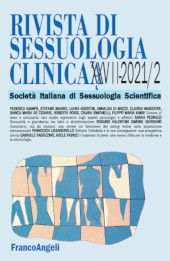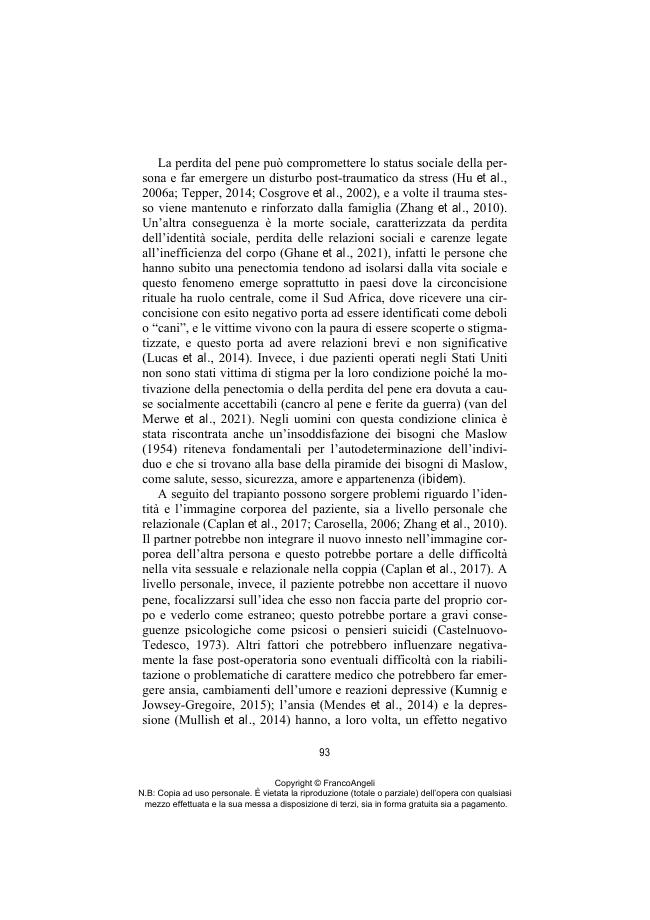2021 - Franco Angeli
Articolo
Versione Digitale
Download | Copia/incolla | Stampa
Il trapianto di pene : una nuova sfida per la medicina e la sessuologia
87-99 p.
- Il trapianto di pene è un intervento ancora sperimentale e alternativo alla falloplastica. Questo trattamento presenta maggiori benefici, ma anche maggiori rischi per i riceventi dell'organo e gli effetti a lungo termine sono ancora sconosciuti. Ad oggi ci sono stati solo cinque casi al mondo e quasi tutti hanno dato risultati incoraggianti sia dal punto di vista fisiologico che psicosessuale. La perdita del pene può essere vissuta come un trauma che porta le persone ad isolarsi e, in alcuni contesti culturali, ad essere stigmatizzate, e questo ha conseguenze sulla sfera psicologica, sessuale, sociale e relazionale della persona, sia per il forte valore simbolico del pene, sia per la sua funzione anatomica. È importante indagare le fantasie e le aspettative sia del ricevente affinché all'intervento non venga associato un effetto miracoloso, che del personale medico affinché ci sia una comunicazione chiara con il paziente su rischi, benefici e possibili alternative.
- È consigliato un processo di valutazione psicosessuale del paziente in modo che possano essere valutate le sue risorse intrapersonali e interpersonali poiché l'intero iter terapeutico è lungo e difficoltoso per via del suo impatto sull'identità della persona e del lavoro di integrazione del nuovo organo nel Sé. Quindi è importante, laddove è possibile, rendere partecipe del percorso anche famiglia e partner. La figura dello psicosessuologo è quindi fondamentale sia per la natura intima del trattamento, sia per gli aspetti della vita coinvolti e il suo coinvolgimento è consigliato per tutto l'iter terapeutico per ridurre le possibilità di un rigetto psicologico and il sorgere di disagi psicosessuali. [Testo dell'editore].
- The penis transplant is still an experimental and alternative surgery to phalloplasty. This treatment has greater benefits, but also great risks for the recipient of the organ and its longterm effects are still unknown. Today, there have been five cases in the world and almost all of them have given encouraging physiological and psychosexual results. The loss of the penis can be experienced as a trauma and this leads people to isolate themselves and, in some culture, to be stigmatized with consequences on the psychological, sexual, social, and relational area of the person, both for the strong symbolic value of the penis, and for its anatomical function. It is important to inquire the fantasies and expectations of both the recipient so that the surgery is not associated with a miraculous effect, and the medical staff so that there is clear communication with the patient about risks, benefits, and possible alternatives.
- It is recommended a process of psychosexual valuation of the patient so that his intrapersonal and interpersonal resources can be valuated since the therapeutic process is long and difficult due to its impact on the identity of the person and the work of integrating the new organ in the Self. So, it is important, where possible, to involve the family and the partner in the process. The figure of the psychosexologist is therefore fundamental both for the intimate nature of the treatment and for the aspects of life involved and his involvement is recommended throughout the therapeutic process to reduce the possibility of psychological rejection and the rising of psychosexual diseases. [Publisher's text].
Fa parte di
Rivista di sessuologia clinica : 2, 2021-
Informazioni
Codice DOI: 10.3280/RSC2021-002005
ISSN: 1972-5183
PAROLE CHIAVE
- trapianto di pene, falloplastica, approccio biopsicosociale, identità di genere, identità sessuale
- penis transplant, phalloplasty, biopsychosocial approach, gender identity, sexual identity
-
Nello stesso fascicolo
- Tumore al seno e sessualità : uno studio esplorativo sugli aspetti psicologici e affettivi
- Sessualità e gravidanza : tra tabù e disinformazione
- Conoscersi, ma da lontano : una review sul fenomeno del dating online nella popolazione eterosessuale
- Definire l'infedeltà e le sue conseguenze : una prospettiva clinica
- Il trapianto di pene : una nuova sfida per la medicina e la sessuologia
- Segnalazioni bibliografiche
- Convegni



